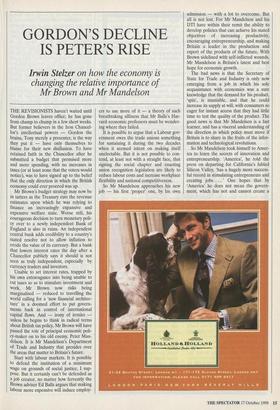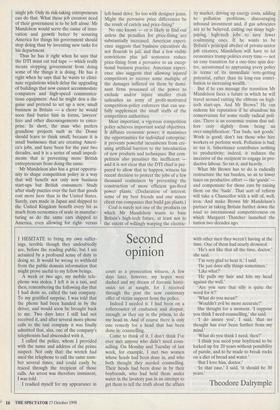GORDON'S DECLINE IS PETER'S RISE
Irwin Stelzer on how the economy is
changing the relative importance of Mr Brown and Mr Mandelson
THE REVISIONISTS haven't waited until Gordon Brown leaves office; he has gone from champ to chump in a few short weeks. But former believers in the Iron Chancel- lor's intellectual powers — Gordon the brains, Tony merely a presenter, is the way they put it — have only themselves to blame for their new disillusion. To have retained faith in the Chancellor after he submitted a budget that promised more and more spending, with no increases in taxes (or at least none that the voters would notice), was to have signed up to the belief that the only direction in which the British economy could ever proceed was up.
Mr Brown's budget strategy may now be in tatters as the Treasury cuts the revenue estimates upon which he was relying to finance an increasingly expansive and expensive welfare state. Worse still, his courageous decision to turn monetary poli- cy over to a newly independent Bank of England is also in ruins. An independent central bank adds credibility to a country's stated resolve not to allow inflation to erode the value of its currency. But a bank that lowers interest rates the day after a Chancellor publicly says it should is not seen as truly independent, especially by currency traders and investors.
Unable to set interest rates, trapped by his own extravagance into being unable to cut taxes so as to stimulate investment and work, Mr Brown now risks being marginalised — reduced to travelling the world calling for a 'new financial architec- ture' in a doomed effort to put govern- ments back in control of international capital flows. And — irony of ironies unless he begins to think in radical terms about British tax policy, Mr Brown will have passed the role of principal economic poli- cy-maker on to his old enemy, Peter Man- delson. It is Mr Mandelson's Department of Trade and Industry that presides over the areas that matter to Britain's future.
Start with labour markets. It is possible to defend the institution of a minimum wage on grounds of social justice, I sup- pose. But it certainly can't be defended as a job creator, no matter how fervently the Brown adviser Ed Balls argues that making labour more expensive will induce employ-
ers to use more of it — a theory of such breathtaking silliness that Mr Balls's Har- vard economic professors must be wonder- ing where they failed.
It is possible to argue that a Labour gov- ernment owes the trade unions something for sustaining it during the two decades when it seemed intent on making itself unelectable. But it is not possible to con- tend, at least not with a straight face, that signing the social chapter and enacting union recognition legislation are likely to reduce labour costs and increase workplace flexibility and national competitiveness.
So Mr Mandelson approaches his new job — his first 'proper' onc, by his own admission — with a lot to overcome. But all is not lost. For Mr Mandelson and his DTI have within their remit the ability to develop policies that can achieve his stated objectives of increasing productivity, encouraging entrepreneurship, and making Britain a leader in the production and export of the products of the future. With Brown sidelined with self-inflicted wounds, Mr Mandelson is Britain's latest and best hope for economic growth.
The bad news is that the Secretary of State for Trade and Industry is only now emerging from a job in which his sole acquaintance with economics was a sure knowledge that the demand for his product, `spin', is insatiable, and that he could increase its supply at will, with consumers so eager for instant access that they had little time to test the quality of the product. The good news is that Mr Mandelson is a fast learner, and has a visceral understanding of the direction in which policy must move if Britain is to share in the fruits of the infor- mation and technological revolutions.
So Mr Mandelson took himself to Amer- ica to learn the secrets of innovation and entrepreneurship. 'America', he told the press on departing for California's fabled Silicon Valley, 'has a hugely more success- ful record in stimulating entrepreneurs and creating jobs. . . . ' One hopes that by `America' he does not mean the govern- ment, which has not and cannot create a single job. Only its risk-taking entrepreneurs can do that. What these job creators need of their government is to be left alone. Mr Mandelson would serve the cause of inno- vation and growth better by scouring America for things his government should stop doing than by inventing new tasks for his department.
Thus he has it right when he says that the DTI must cut red tape — which really means stopping government from doing some of the things it is doing. He has it right when he says that he wants to elimi- nate regulations which delay the upgrading of buildings that now cannot accommodate computers and high-speed communica- tions equipment. And he might don a dis- guise and pretend to set up a new, small business in Britain — a chore he would soon find buries him in forms, lawyers' fees and other discouragements to enter- prise. In short, the man who prefers grandiose projects such as the Dome should learn to think small, because it is small businesses that are creating Ameri- ca's jobs, and have been for the past two decades, and it is a series of small impedi- ments that is preventing more British entrepreneurs from doing the same.
Mr Mandelson also has a great opportu- nity to shape competition policy in a way that will benefit not only new business start-ups but British consumers. Study after study puzzles over the fact that goods cost more here than in the United States. Surely, cars made in Japan and shipped to the United Kingdom benefit every bit as much from economies of scale in manufac- turing as do the same cars shipped to America, even allowing for right- versus left-hand drive. So too with designer jeans. Might the pervasive price differences be the result of cartels and price-fixing?
No one knows — or is likely to find out unless the penalties for price-fixing are substantially increased. American experi- ence suggests that business executives do not flourish in jail, and that a few visible convictions plus jail sentences reduce price-fixing from a pervasive to an excep- tional business practice. American experi- ence also suggests that allowing injured competitors to recover some multiple of the damages inflicted on them by domi- nant firms possessed of the power to exclude and/or injure smaller rivals unleashes an army of profit-motivated competition-policy enforcers that can use- fully supplement the small staffs of the competition authorities.
Most important, a vigorous competition policy achieves important social objectives. It diffuses economic power; it maximises the opportunities for individual enterprise; it prevents powerful incumbents from cre- ating artificial barriers to the introduction of new products and techniques. But com- petition also penalises the inefficient and it is not clear that the DTI chief is pre- pared to allow that to happen, witness his recent decision to protect the jobs of a few thousand coalminers by preventing the construction of more efficient gas-fired power plants. (Declaration of interest: some of my best friends and one minor client run companies that build gas plants.) Coal is surely not one of the products on which Mr Mandelson wants to base Britain's high-tech future, at least not to the extent of willingly warping the electric- ity market, driving up energy costs, adding to pollution problems, discouraging inbound investment and, if gas advocates are to be believed, cutting out many high- paying, high-tech jobs to save fewer coalmining ones. If he wants to be Britain's principal abetter of private-sector job creators, Mandelson will have to let economics trump politics every time — not an easy transition for a one-time spin doc- tor, accustomed to appraising every policy in terms of its immediate vote-getting potential, rather than its long-run contri- bution to increasing wealth.
But if he can manage the transition Mr Mandelson faces a future in which he will travel around cutting the ribbons on high- tech start-ups. And Mr Brown? He can redeem his reputation if he abandons his conservatism for some really radical poli- cies. There is an economic truism that suf- fers only slightly from being an over-simplification: 'Tax bads, not goods.' Work is good; don't tax those who hire workers or perform work. Pollution is bad; so tax it. Inheritance contributes nothing to productivity; indeed, it reduces the incentive of the recipient to engage in pro- ductive labour. So tax it, and heavily.
What Mr Brown has to do is radically restructure the tax burden, so as to lower taxes on productive effort — the 'goods' and compensate for those cuts by raising them on the 'bads'. That sort of reform will take a Chancellor with a will of, well, iron. And make Brown Mr Mandelson's partner in taking Britain further down the road to international competitiveness on which Margaret Thatcher launched the nation two decades ago.











































































 Previous page
Previous page